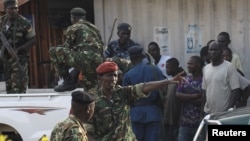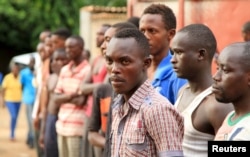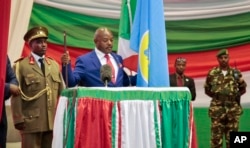More than two dozen senior military and police officials in Burundi have gone on trial for their alleged involvement in a failed coup attempt to oust President Pierre Nkurunziza.
The 28 defendants, including former defense minister Cyrille Ndayirukiye and five generals, appeared in a courtroom Friday in the central town of Gitega.
Prosecutors say the men are charged with trying to overthrow the government in May, as well as killing soldiers and other acts of violence.
Defense attorneys say they have had insufficient access to their clients' case files. They say the defendants have been mistreated in jail and are living in degrading conditions.
Burundi has been in turmoil since April when Nkurunziza announced he would seek a third term. Critics said he was violating the constitution's two-term limit, as well as an agreement that ended Burundi's 12-year civil war.
The president was re-elected in July, but violence has since escalated.
The U.S. special envoy for Africa's Great Lakes region, Thomas Perriello, told VOA's Central Africa service Monday that "the situation in Burundi is grave. We must focus on the security of the people."
Perriello visited Uganda recently, along with a team of envoys from the United Nations, African Union and European Union, to emphasize the need to launch a regional mediation for Burundi. He said he is optimistic the talks will begin soon in Uganda. "We think the talks should have started a while back, but tomorrow is the next best option," he said.
Weekend attacks
At least 87 people were killed over the weekend in Bujumbura after armed men attacked three military bases. It was the worst violence since the failed coup in May and has led to intensified calls for dialogue and regional mediation.
Security forces fought off assaults on three army bases from as-of-yet unidentified armed men. Witnesses say security forces then rounded up youth in opposition neighborhoods late Friday and Saturday.
One witness who did not want his name used for fear of reprisal said it was police officers doing house-to-house searches, especially in his area, Nyakabiga. He says they went in, arrested youths and then killed some of them, saying they are the ones who are against the government.
Police deny that allegation.
Among the dead were eight security officers and scores of assailants, according to an army spokesman.
Crisis origin
Opposition to the president has grown more violent in recent weeks, and there have been almost daily clashes between armed vigilantes and police.
Yolande Bouka, a researcher for Conflict Prevention and Risk Analysis Division of the Institute for Security Studies, says the latest events in Burundi are a worrying escalation.
“People, who were initially peaceful protesters, some of them have been radicalized or feel like there is no political avenue to see any real change in Burundi," Bouka said. "But it's definitely a clear sense that things are changing. That being said, I think it needs to be clear that there remains a great deal of people who remain peacefully opposed to President Nkurunziza's third mandate.”
Political dialogue stalls
Efforts at international mediation or domestic political dialogue appear stalled.
“The lack of political dialogue, between the opposition groups and the ruling party, has made it possible for individuals seeking to recruit young people to engage violent action against the state easier," Bouka said. "And unfortunately, what we see is a clear sign that the East African community has not been able to mediate the situation in Burundi. In fact, it's going toward the direction of a civil war if we don’t intervene.”
Security forces have increased their presence in the capital, searching for weapons and youths they suspect to be involved in protests and armed groups.
Police spokesman Pierre Nkurikiye told VOA on Monday that the operation is ongoing.
“In the city, police are continuing to secure the people and property. Police are doing its daily job," he said.
Human rights groups have accused security forces and militia allied to the ruling party of abuses against civilians and protesters, an accusation denied by the Burundi government.
In a tweet Sunday, U.S. Secretary of State John Kerry called for dialogue and said the killing must end including, he said, the "disproportionate response by security forces."
Also Sunday, the State Department told U.S. citizens to avoid traveling to Burundi, and recommended that those already in the country leave as soon as possible as political violence persists.
The United Nations says violence in Burundi since April has killed more than 240 people and prompted 220,000 Burundians to flee the country.
Targeting refugees
Washington-based humanitarian group Refugees International said Monday it is concerned about claims from Burundian refugees in Rwanda who said they have been recruited by armed groups in Burundi.
Rwanda is hosting nearly one-third of the refugees, including 45,000 at its Mahama camp. Refugees International's report cites international officials who describe recruitment efforts at Mahama, mainly targeting adult men, but some cases involving children between the ages of 15 and 17. The report says those who decline to join the armed groups face harassment.
Refugees International is calling on Rwanda to ensure any recruitment is immediately stopped, and to publicly affirm that such efforts violate the country's law and international law. It also wants the United Nations and African Union to impose sanctions against anyone violating "the civilian and humanitarian character of asylum."
Perriello said any form of recruitment in the camps is an absolute violation of international laws and norms. Perriello, along with the international team of envoys, will be traveling to Kigali, Rwanda, on Tuesday and the issue is likely to be discussed.
"We have had to make clear to all the neighbors of Burundi the importance of refugee camps being sacrosanct," he said.
VOA's Megan Duzor contributed to this report.






